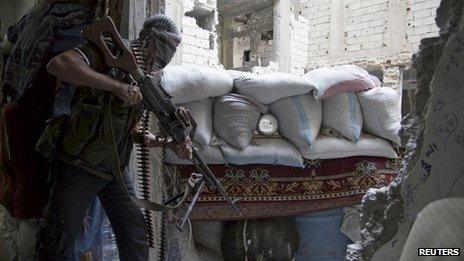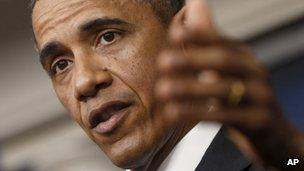Syria overshadows G8 Lough Erne summit
- Published

At least 93,000 people have been killed in Syria's two-year conflict, the UN says
Even as he beefs up America's aid to Syrian rebels, President Barack Obama doesn't appear eager to engage in this knotty problem.
Since he ordered his administration to provide military help to the rebels he has spoken in public on the role of fathers, lesbian and gay rights and the importance of basketball coaches as role models, but not a word has crossed his lips about the policy shift.
It's not formally on the agenda, but Syria will loom large when the leaders of some of the world's most important countries meet in Northern Ireland.
The fighting in Syria could destabilise the whole Middle East but there is no agreement what, if anything, should be done about it.
President Obama's first engagement is a speech in Belfast when he'll talk about the achievements of the peace process.
He is likely to reflect that US involvement helped heal the wounds. He probably won't say that peace is only possible when people have had enough of war - when carrying on fighting is worse than not winning everything you want.
But that is a sobering thought for those worried about Syria. The Irish conflict took about 300 years to work itself out if you take the long view, and three decades if you take a shorter perspective.
Leaning on Putin
How the world deals with Syria may not be decided in the next few days. But it is an important week and there are two key meetings for the president.
The first, before the formal summit even begins, is with David Cameron. I strongly suspect the British prime minister is far more enthusiastic about military support for the rebels than the president.
But Mr Cameron is held back by his backbenchers, while Mr Obama is restrained by his distaste for further American entanglement in the Middle East.
There are many authoritative sounding reports, external detailing how America may help the rebels, but the White House is still being exceedingly coy. The only items officials would name were "meals ready to eat" and "medical kits".

Mr Obama grudgingly approved US military aid to Syrian rebels
They say the scope of military aid will grow, but absolutely refuse to specify if they are supplying just small arms, or heavier weaponry - or indeed if any of the help is in the form of weapons of any type. They say that this is the sort of question Mr Obama and Mr Cameron will discuss.
A less chummy meeting for the president will be with Vladimir Putin. The Russians do not accept the American claim that President Assad has used chemical weapons. Neither do they accept the US contention that he has to leave power before there is a settlement.
But Mr Obama will try to persuade his Russian counterpart that if he wants to avoid chaos and extremism in Syria, he's going the wrong way about it.
If there's one thing more dangerous than a Syrian civil war, it is a Syrian civil war that brings the West and Russia into potential conflict, and not just around the table of the G8.
The White House, accused by many of being too cautious and hesitant for too long, says Syria is in a new, critical phase. President Obama is loath to put the US out front, imposing its will on the world.
This week will see if his more painstaking approach of weaving agreements and consensus can pay dividends.
Mark Mardell is travelling with the president